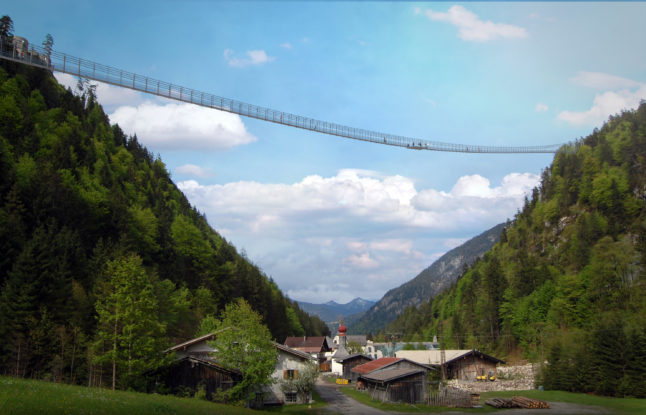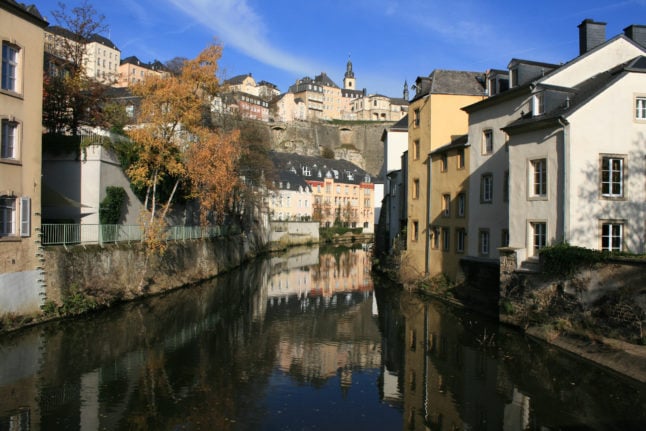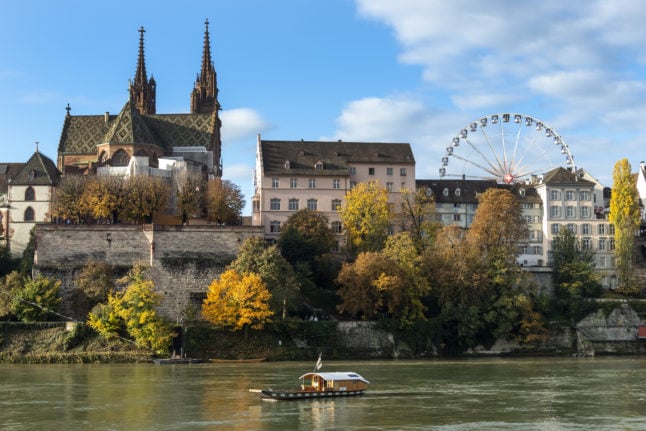Which foreign countries can you visit with Germany's €49 ticket?

A number of Germany's regional trains and buses travel across the border to places like Switzerland and the Netherlands. We look at how you can use the €49 ticket to get there.
Germany shares a border with eight hugely diverse European countries, from Denmark in the far north to Austria and Switzerland in the south.
With so many cities and towns lying close to these land borders, it's not unusual to see people commuting across them each day to go to work or even just to the shops. To cater to this crowd (and the summer holidaymakers), there are numerous cross-border trains and bus services that run between Germany and its neighbouring countries.
The question that's been confusing many is whether Germany's €49 monthly travel ticket - which has been available to use since May 1st - will be valid on these services after they cross the border into a different country. After all, the ticket is only meant to be valid on regional and local services, rather than long distance trains.
READ ALSO: Reader Question: Can I still get Germany's €49 travel ticket for May?
Incredibly enough, it is possible to visit some foreign countries using the bargain travel deal - and you can make it to some surprising destinations.
Here are the places you can visit using Germany's €49 ticket this summer.
Austria

The mountain rope-bridge in the Tirolian region of Reutte. Photo: picture alliance / dpa-tmn | Marktgemeinde Reutte
The charming mountains and lakes of Austria are just a stone's throw from Bavaria, and it takes hardly any time at all to reach them with the Bavarian Regional Rail (BRB).
If you'd like to visit one of Austria's most beautiful cities this summer, you'll be pleased to know that the €49 ticket is valid all the way from Freilassing to Salzburg, the picturesque birthplace of Mozart. For this route, you can either take a BRB train or an S3 train run by Austrian Rail (ÖBB). The popular Tirolian hiking regions of Vils, Reutte und Ehrwald can also be reached with the €49 ticket while travelling from Pfronton-Steinach to Griesen (near Garmisch-Patenkirchen).
Here are the routes that the €49 ticket is valid for:
- BRB: Freilassing – Salzburg
- BRB: Kiefersfelden – Kufstein
- ÖBB (S3): Freilassing – Salzburg
- DB Regio AG: Pfronten-Steinach – Vils – Reutte (Tirol) – Ehrwald – Griesen
Belgium
From Aachen in North Rhine-Westphalia, it doesn't take long to hop across the border into Belgium to the small municipality of Kelmis. Kelmis isn't all that interesting in itself (though it does have an old castle that's worth a visit). But you'll be well placed to travel on from there to Liege (in 45 minutes) or Brussels (in one hour and 45 minutes). Of course, you'll have to buy a new ticket for this last stretch of the journey in Belgium.
- ASEAG (23): Aachen Bus Station − Preusweg − Kelmis
France
If you'd like to spend some time in France this summer, the Alsace Express and the Wine Route Express will both take you over the border from Rhineland-Palatinate to the pretty town of Wissembourg with the €49 ticket. Though the Alsace region is arguably the most 'German' part of France, it also represents a fascinating meeting place for the two countries' cultures, histories and languages - and is certainly worth a visit at least once.
If you find yourself in Saarland, you can also reach a number of locations in France with the €49 ticket on the Saarbahn, including Carling, Creutzwald and Saargemünd.
- Alsace Express: Mainz - Wissembourg
- Wine Route/Weinstraßen-Express: Koblenz - Wissembourg
- Saarbahn (S1): Saarbrücken - Saargemünd
- Saarbahn (MS2): Saarloius - Creutzwald
- Saarbahn (184): Bous - Carling
Luxembourg

Luxembourg City, the quaint capital of Luxembourg. Photo: picture alliance / dpa-tmn | Bernd F. Meier
For those in the Rhineland-Palatinate area, hopping across the border into beautiful Luxembourg is also covered by the €49 ticket. The good news is, public transport within Luxembourg is completely free - so once you're across the border, you'll be travelling for nothing anyway.
- VRT Bus 410: Bitburg – Luxembourg
- VRT Bus 455: Bitburg – Vianden
- VRT Bus 460: Gerolstein – Clervaux
- VRT trains to Luxembourg
The Netherlands
OK, it's not exactly Amsterdam, but there are a number of little towns dotted along near the border with North Rhine-Westphalia that you can reach with the €49 ticket, including Vaals and Kerkrade. In most cases, you'll need to rely on the Aachen Transport Association trains to get you there, though there are some buses running between Germany and the Netherlands too.
- ASEAG (25): Stolberg Mühlener Bahnhof – Vaals
- ASEAG (33): Fuchserde − Vaals
- ASEAG (34): Diepenbenden – Kerkrade
- WestVerkehr Bus (SB3): Geilenkirchen – Sittard
- Arriva Bus (350): Aachen – Vaals
READ ALSO: Five European cities you can reach in under five hours from Frankfurt
Poland
Unfortunately the range of options to travel to with the €49 ticket in Poland are limited, but if you fancy a break on the Baltic coast, you can hop over from Usedom in Mecklenburg Western-Pomerania to Swinemünde in Poland at no extra charge. Unfortunately, to get to Szczecin, you'll have to switch to a regular ticket after the last stop in Germany on the train.
- DB Regio AG: Züssow – Świnoujście Centrum (Swinemünde Zentrum)
Switzerland

The picturesque Swiss city of Basel, which you can visit with the €49 ticket. Photo: picture alliance/dpa/KEYSTONE | Georgios Kefalas
The words 'Switzerland' and 'cheap' don't normally go together, but if you've bought a €49 ticket, you can at least reach one or two destinations in Switzerland on a budget.
The first and most obvious of these is Basel, a charming medieval city nestled close to the borders of both France and Germany. Basel is a popular place to visit for a short city break and is also not far from the Euro Airport, which due to its location serves three different cities in three different countries. You can reach Basel with the €49 ticket on both Swiss and German-run services, as well as some more rural Swiss destinations along the train route from Erzingen to Biesingen in Baden-Württemberg.
- SBB: Zell im Wiesenthal – Lörrach – Basel Bad. Bf
- DB Regio AG: Weil am Rhein – Basel Bad. Bf
- DB Regio AG: Erzingen (Baden) – Trasadingen – Schaffhausen – Thayngen – Bietingen
READ ALSO: Basel vs. Freiburg: Which city is better to live in?
Comments
See Also
Germany shares a border with eight hugely diverse European countries, from Denmark in the far north to Austria and Switzerland in the south.
With so many cities and towns lying close to these land borders, it's not unusual to see people commuting across them each day to go to work or even just to the shops. To cater to this crowd (and the summer holidaymakers), there are numerous cross-border trains and bus services that run between Germany and its neighbouring countries.
The question that's been confusing many is whether Germany's €49 monthly travel ticket - which has been available to use since May 1st - will be valid on these services after they cross the border into a different country. After all, the ticket is only meant to be valid on regional and local services, rather than long distance trains.
READ ALSO: Reader Question: Can I still get Germany's €49 travel ticket for May?
Incredibly enough, it is possible to visit some foreign countries using the bargain travel deal - and you can make it to some surprising destinations.
Here are the places you can visit using Germany's €49 ticket this summer.
Austria

The charming mountains and lakes of Austria are just a stone's throw from Bavaria, and it takes hardly any time at all to reach them with the Bavarian Regional Rail (BRB).
If you'd like to visit one of Austria's most beautiful cities this summer, you'll be pleased to know that the €49 ticket is valid all the way from Freilassing to Salzburg, the picturesque birthplace of Mozart. For this route, you can either take a BRB train or an S3 train run by Austrian Rail (ÖBB). The popular Tirolian hiking regions of Vils, Reutte und Ehrwald can also be reached with the €49 ticket while travelling from Pfronton-Steinach to Griesen (near Garmisch-Patenkirchen).
Here are the routes that the €49 ticket is valid for:
- BRB: Freilassing – Salzburg
- BRB: Kiefersfelden – Kufstein
- ÖBB (S3): Freilassing – Salzburg
- DB Regio AG: Pfronten-Steinach – Vils – Reutte (Tirol) – Ehrwald – Griesen
Belgium
From Aachen in North Rhine-Westphalia, it doesn't take long to hop across the border into Belgium to the small municipality of Kelmis. Kelmis isn't all that interesting in itself (though it does have an old castle that's worth a visit). But you'll be well placed to travel on from there to Liege (in 45 minutes) or Brussels (in one hour and 45 minutes). Of course, you'll have to buy a new ticket for this last stretch of the journey in Belgium.
- ASEAG (23): Aachen Bus Station − Preusweg − Kelmis
France
If you'd like to spend some time in France this summer, the Alsace Express and the Wine Route Express will both take you over the border from Rhineland-Palatinate to the pretty town of Wissembourg with the €49 ticket. Though the Alsace region is arguably the most 'German' part of France, it also represents a fascinating meeting place for the two countries' cultures, histories and languages - and is certainly worth a visit at least once.
If you find yourself in Saarland, you can also reach a number of locations in France with the €49 ticket on the Saarbahn, including Carling, Creutzwald and Saargemünd.
- Alsace Express: Mainz - Wissembourg
- Wine Route/Weinstraßen-Express: Koblenz - Wissembourg
- Saarbahn (S1): Saarbrücken - Saargemünd
- Saarbahn (MS2): Saarloius - Creutzwald
- Saarbahn (184): Bous - Carling
Luxembourg

For those in the Rhineland-Palatinate area, hopping across the border into beautiful Luxembourg is also covered by the €49 ticket. The good news is, public transport within Luxembourg is completely free - so once you're across the border, you'll be travelling for nothing anyway.
- VRT Bus 410: Bitburg – Luxembourg
- VRT Bus 455: Bitburg – Vianden
- VRT Bus 460: Gerolstein – Clervaux
- VRT trains to Luxembourg
The Netherlands
OK, it's not exactly Amsterdam, but there are a number of little towns dotted along near the border with North Rhine-Westphalia that you can reach with the €49 ticket, including Vaals and Kerkrade. In most cases, you'll need to rely on the Aachen Transport Association trains to get you there, though there are some buses running between Germany and the Netherlands too.
- ASEAG (25): Stolberg Mühlener Bahnhof – Vaals
- ASEAG (33): Fuchserde − Vaals
- ASEAG (34): Diepenbenden – Kerkrade
- WestVerkehr Bus (SB3): Geilenkirchen – Sittard
- Arriva Bus (350): Aachen – Vaals
READ ALSO: Five European cities you can reach in under five hours from Frankfurt
Poland
Unfortunately the range of options to travel to with the €49 ticket in Poland are limited, but if you fancy a break on the Baltic coast, you can hop over from Usedom in Mecklenburg Western-Pomerania to Swinemünde in Poland at no extra charge. Unfortunately, to get to Szczecin, you'll have to switch to a regular ticket after the last stop in Germany on the train.
- DB Regio AG: Züssow – Świnoujście Centrum (Swinemünde Zentrum)
Switzerland

The words 'Switzerland' and 'cheap' don't normally go together, but if you've bought a €49 ticket, you can at least reach one or two destinations in Switzerland on a budget.
The first and most obvious of these is Basel, a charming medieval city nestled close to the borders of both France and Germany. Basel is a popular place to visit for a short city break and is also not far from the Euro Airport, which due to its location serves three different cities in three different countries. You can reach Basel with the €49 ticket on both Swiss and German-run services, as well as some more rural Swiss destinations along the train route from Erzingen to Biesingen in Baden-Württemberg.
- SBB: Zell im Wiesenthal – Lörrach – Basel Bad. Bf
- DB Regio AG: Weil am Rhein – Basel Bad. Bf
- DB Regio AG: Erzingen (Baden) – Trasadingen – Schaffhausen – Thayngen – Bietingen
READ ALSO: Basel vs. Freiburg: Which city is better to live in?
Join the conversation in our comments section below. Share your own views and experience and if you have a question or suggestion for our journalists then email us at [email protected].
Please keep comments civil, constructive and on topic – and make sure to read our terms of use before getting involved.
Please log in here to leave a comment.